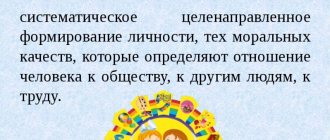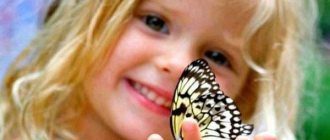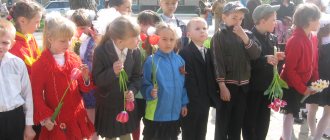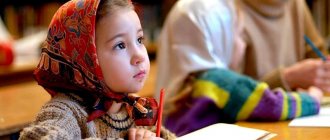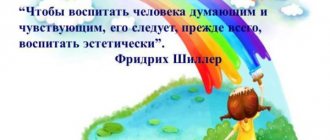Morality is a person’s internal attitude to act in accordance with conscience and free will, the individual’s internal requirements for himself. Morality is also understood as a set of norms of behavior for every person in society, the internal qualities of a person and their expression, which determine his behavior in society. Moral education is the process of forming a harmonious personality, developing a holistic value-semantic dominant in preschool children. Moral education is one of the most important stages in a child’s upbringing, necessary for his personal development in society. This process conveys to the child a system of generally accepted fundamental values that determine the relationships of people in society, in the family, as well as principles and norms based on the concepts of good and evil, truth and lies, positive and negative in a global sense. What are the main means and methods of moral education of preschool children? What is the role of moral education of preschool children in the family?
Main aspects of moral education of preschool age
The relevance of the problem of moral education is due to the crisis of modern society, in which there has been an erosion of moral norms, the importance of the institution of family, and spiritual values, which significantly complicates the path of personal development of a preschool child. Moral education is designed to contribute to the formation of a harmonious personality, aware of the norms and values that determine the foundations of relations between people in society.
The crisis of morality in society is facilitated by modern frivolous methods of raising children, in which the child receives the basics of moral education outside the family through means imposed by a demoralized society (for example, computer games that develop selfishness and cruelty).
Why should moral education begin at a very early age? During this period, the child is maximally open to emotional experience and empathy. The child takes the words and actions of adults for granted, without questioning them, which happens at an older age when the child learns to analyze words and actions, compare experiences and draw certain, not always correct, conclusions. The experience acquired by young children will later move into the category of what is proper, true, canonical, and beyond doubt.
Moral education in preschool age is implemented through a system of methods and means, but the main source of moral education and the formation of a harmonious personality of a child is his family. An auxiliary mechanism for the implementation of moral education of preschool children are kindergartens, whose role is to correct errors in raising a child in the family.
Basic methods of moral education of preschool children
Moral education of preschool children is a complex process of forming the child’s beliefs and value system, implemented through certain methods, which include:
- Persuasion and Conversation;
- Inspiration to action;
- Appeal to sympathy and empathy;
- Encouragement;
- Punishment.
At preschool age, the child does not yet understand what is good and what is bad, but he is maximally open to the emotional perception of the situation. Therefore, in the early period of moral education of preschoolers, standard methods are ineffective.
Many parents, in the process of educating morality in a child, assign the main role to the mechanisms of reward and punishment, incorrectly interpreting these methods, reducing them to material reward and physical punishment or material deprivation. As practice shows, this tactic is also ineffective in the long term, since physical and material deprivation is a manifestation of external moral control for preschool children. Moral education is designed to stimulate the manifestation of internal encouragement (oneself) and internal deprivation (punishment - unauthorized refusal of encouragement, benefit).
Basic means of moral education of preschool children
The thinking and ideas of a preschool child, whose moral education is realized through a certain system of means, are extremely concrete, so they need clear, understandable forms and symbols to understand such abstract concepts of moral principles as kindness, loyalty, gratitude, responsiveness, love, beauty and others. Among the main means of moral education of preschoolers are:
- Fairy tale;
- A game;
- Creative task, labor, human activity;
- Nature;
- Communication with both peers and adults;
- The collective - the children's environment - is one of the important means of moral education of preschoolers, allowing the child to develop and express his individuality within the framework of a specific society governed by its own laws and norms. This is one of the necessary mechanisms for instilling collectivism, which cannot be realized in any other conditions. The harmonious development of the individual is impossible without a team, since a person is a social being, living in society and being part of it. Raising collectivism in a child must inevitably overcome the contradiction - the suppression of the individual by the collective. Overcoming this problem independently will allow the child to learn to live and develop in society within the generally accepted framework of norms and morality.
These means of developing morality in a child are accessible and easily applicable in practice, both in the conditions of raising a child in a kindergarten and in the family.
The mechanism of moral development of personality
The strength and stability of a moral quality depend on how it was formed, what mechanism was used as the basis for pedagogical influence. Let us consider the mechanism of moral development of personality. For the formation of any moral quality, it is important that it takes place consciously. Therefore, knowledge is needed on the basis of which the child will form ideas about the essence of moral quality , its necessity and the advantages of mastering it. The child must have a desire to master a moral quality , that is, it is important that motives arise for acquiring the corresponding moral quality . The emergence of a motive entails an attitude towards quality, which, in turn, shapes social feelings. Feelings give the formation process a personally significant coloring and therefore influence the strength of the emerging quality. But knowledge and feelings generate the need for their practical implementation - in actions and behavior. Actions and behavior take on the function of feedback, allowing you to check and confirm the strength of the quality being formed.
Thus, the mechanism of moral education : (knowledge and ideas) + (motives) + (feelings and attitudes) + (skills and habits) + + (actions and behavior) = moral quality . This mechanism is objective in nature. It always manifests itself during the formation of any ( moral or immoral ) personality trait.
The main feature of the mechanism of moral education is the absence of the principle of interchangeability. This means that each component of the mechanism is important and can neither be excluded nor replaced by another. What, for example, will happen if we decide to form kindness as a moral quality of an individual and begin to instill in a child only ideas about what kindness is? Or will we not evoke a positive attitude towards this quality and the desire to master it, to become kind? Or will we not create conditions for the manifestation of kindness? Assignment: Try to explain what will happen to moral quality if one of the components is excluded. Is it possible to replace it with another component? At the same time, the action of the mechanism is flexible: the sequence of components can change depending on the characteristics of the quality (its complexity, etc.) and the age of the object of education . It is clear that it is impossible to rely on understanding and awareness of the importance of developing one or another personality quality in a child of primary preschool age . But does this mean that the time has not yet come to educate him morally ? Of course not. We need to change the sequence and start not with imparting knowledge, but with the formation of an emotional base and behavioral practice. This will serve as a favorable basis for subsequent knowledge acquisition.
The first group of tasks of moral education includes the tasks of forming its mechanism: ideas, moral feelings , moral habits and norms , and behavioral practices. Each component has its own formation characteristics, but it must be remembered that this is a single mechanism and therefore, when forming one component, an influence on other components is necessarily expected.
Education is historical in nature, and its content changes depending on a number of circumstances and conditions: the demands of society, economic factors, the level of development of science, and the age capabilities of those being educated .
Consequently, at each stage of its development, society solves different problems of educating the younger generation, that is, it has different moral ideals of a person . , the education of collectivism became the most significant , in others - patriotism. Today, business qualities, entrepreneurship, etc. have become significant. And each time the ideal created by society has been extrapolated to preschool childhood , since the phrase “Everything begins with childhood” is not only journalistic and journalistic, it also has a deep scientific meaning and justification.
The role of moral education of preschool children in the family
The fundamentals of moral education of preschool children are implemented in the context of the family. A child, like a little imitator of adults, copies the behavior of his parents, adopts their tactics of dealing with each other and with other people in society. Parents should realize that it is impossible to raise a harmonious, highly moral personality in an unhealthy family atmosphere in which disrespect, selfishness, laziness, and deception prevail.
The family is the main environment for a child to gain experience and knowledge. Kindergartens and other educational institutions are intended only to correct the mistakes parents made in raising preschool children. The moral education of a child in the family must be implemented with maximum respect for his personal dignity. The formation of a child’s moral behavior should not be accompanied by the suppression of his initiative and the manifestation of personal qualities.
For a preschool child, moral education is implemented through the prism of family relationships, which should become that natural role model, by inheriting which the child could become a moral member of society.
For a preschool child, moral education in the family is the basis for the development of his personality.
Fairy tale as a means of moral education
One of the ways to achieve the moral development of preschoolers is through reading fiction; fairy tales are especially good for these purposes. It is the fairy tale that goes through life with the baby, starting from infancy. In a fairy tale, he begins to get acquainted with the relationships of the characters, which are then transferred to the child’s relationships with relatives. Fairy tales are a means of shaping personality, with individual concepts of good and evil. They learn to construct speech, understand the hero’s experiences, and learn to relieve anxiety.
Advice: you need to select fairy tales based on the child’s age, in such a way that they develop his feelings, and not his reason; for this, fairy tales that have a simple plot are ideal.
Good fairy tales are a powerful method of moral education.
The main task of parents during moral development is based on the correct selection of fairy tales, which should only have a positive impact on the child’s emotions. A fairy tale should instill self-confidence. For young children, fairy tales such as:
- Zayushkina's hut.
- The wolf and the seven Young goats.
- Fox with a rolling pin.
- Cat, rooster and fox.
- Boasting hare.
Zayushkina's Izba is a very kind fairy tale.
Works in which good defeats evil will help to sort out the categories of good and evil, saying that evil is always punishable, this is, first of all:
- Zayushkina's hut.
- Little Red Riding Hood.
- Winter quarters.
Fairy tales are the means of shaping the moral education of preschoolers, and they do not give specific instructions, such as: listen to your parents, their plot contains a lesson that parents should discuss with their children while reading.
Still from the wonderful Soviet film Morozko
Fairy tales like this teach you to obey your parents:
- Snow Maiden.
- Sister Alyonushka and brother Ivanushka.
- Swan geese.
They talk about hard work:
- Tiny little thing.
- Princess Frog.
- Moroz Ivanovich.
- Morozko.
